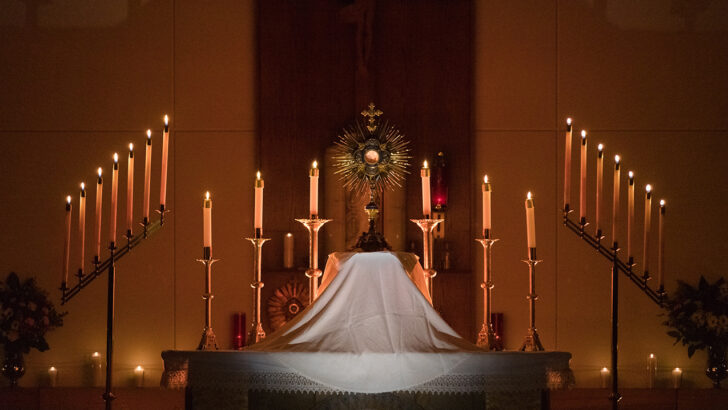Deacon Greg Kandra
June 11 – Solemnity of the Body and Blood of Christ
Dt 8:2-3, 14b-16a
Ps 147:12-13, 14-15, 19-20
1 Cor 10:16-17
Jn 6:51-58
Years ago, I heard the story of a priest who was getting ready for Sunday Mass. While puttering around in the sacristy, he reached into a storage cabinet, took a plastic container of unconsecrated hosts, and started pouring them into a gold ciborium. One of the hosts fell on the floor. The priest picked it up, held it between his thumb and forefinger, and before tossing it in the trash sighed and said, “Oh, to think of what you could have become!”
Corpus Christi
There we see the wonder of Corpus Christi, the late-spring feast when we honour the astounding fact that, in the hands of the priest, a sliver of bread becomes the Body of Christ. In many parishes, there are processions and prayers – monstrances elevated and paraded through streets, as bells ring and Tantum Ergo echoes and the world stops to look and stare and sometimes even, in wonder and adoration, kneel.
But we should also take this moment to reflect on where we are in the liturgical calendar”
Surveys tell us again and again that only a minority of Catholics, about a third, understand that what is being shown, what is being blessed and broken and shared, is the Real Presence of Jesus Christ.
Power
With that in mind, I’m not sure we sufficiently appreciate the full magnitude of this Sunday. Sometimes the pageantry and pomp can overwhelm its meaning and power. The reading from St John’s Gospel seems to underscore the mystery of it all:
“How can this man give us his flesh to eat?,” the Jews asked. And Jesus replied, “My flesh is true food and my blood is true drink.”
Among other things, the scriptures for this Sunday remind us that ours is a God of bewildering creativity, a God who gave manna in the desert and even now enters our lives through loaves of bread and the “cup of blessing”.
We should be humbled by all that this implies. But we should also take this moment to reflect on where we are in the liturgical calendar.
Centuries before Christ, Elijah discovered that God didn’t come in fire or a roaring wind or an earthquake”
Across the last few weeks, we’ve rejoiced in Resurrection, embraced Divine Mercy, celebrated the Good Shepherd, welcomed the Holy Spirit and marvelled at the mystery of the Holy Trinity. Now, after Easter, Corpus Christi Sunday is in some ways the grand finale – the last big Sunday feast for several weeks. We slip at last into the ordinariness of Ordinary Time. But there is still this glimpse of the extraordinary: Christ’s Real Presence, still among us, under the appearance of bread.
If we take nothing else away from this feast, we should remember how God in his greatness continues to dwell among us in the smallest of things.
He came to us once as an infant in a manger. He comes to us now as a crumb of bread.
Miracle
While this feast celebrates the continuing miracle that is (to use a big word) transubstantiation, it also reminds us of another miracle, the generosity and enduring love of our God, one so great, yet who comes to us as something so humble.
Centuries before Christ, Elijah discovered that God didn’t come in fire or a roaring wind or an earthquake. He came in a whisper.
So, too, he comes to us today in a whisper – a sliver of a host, a sip of a cup. It is a mystery of our faith: how God can take the insignificant – the small, the broken, the easily overlooked – and dwell within and make it sacred.
He does it with bread. He can do it with each of us.
As St Augustine once famously put it, “We become what we receive”. How could any of us not be overwhelmed, to consider what we receive in the Eucharist, and to think of what we can become?


